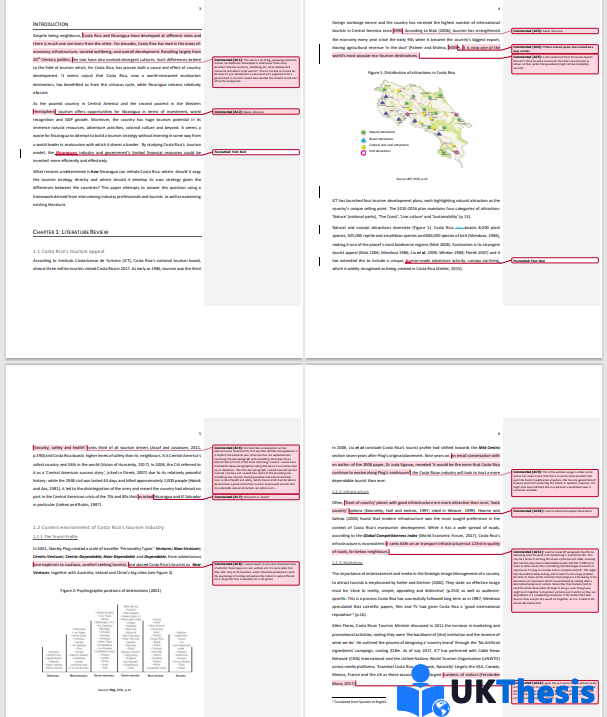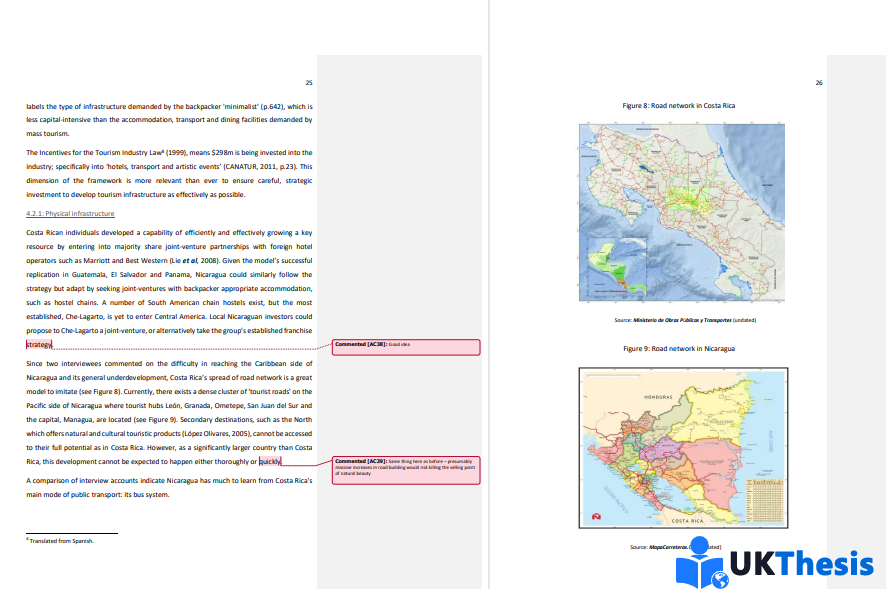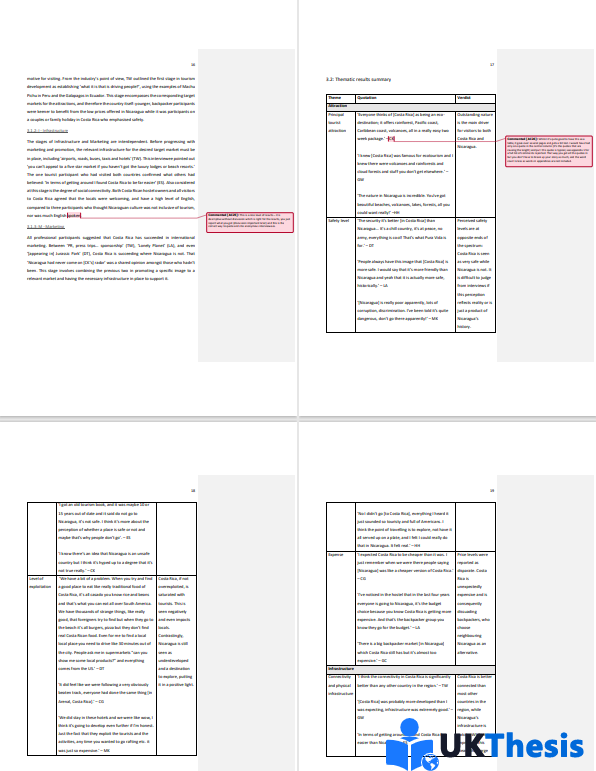Essay君整理的100篇英国Dissertation范文选题参考

现在国内去英国读硕士的中国留学生学生很多,很多毕业生写Dissertation的时候没有方向,这里Essay君就搜集了100篇左右的各个英国学校不同学科的Dissertation给大家。其实不少学校都在官网给出一些dissertation-examples或者Essay examples。但是为了大家方便看,我就整理了下希望大家看起来方便些。另外Essay君也整理了本公司20年来所做的部分Samples给大家做一个呈现,也算这20多年来的一个总结。
利兹大学的 Dissertation examples
Listed below are some of the best examples of research projects and dissertations from undergraduate and taught postgraduate students at the University of Leeds
We have not been able to gather examples from all schools.
Institute of Psychological Sciences 心理学系 Dissertation examples
这里的dissertations得分都在80分以上
An investigation into the relationship between early exposure and brand loyalty
The relationship between sustained and divided attentional abilities and Autistic Spectrum Disorder traits
Experiences of parents of people with anorexia nervosa: an interpretative phenomenological analysis
Autonomous motivation: the key to employee performance and workplace success?
Business School 商业学院 Dissertation examples
To what extent should Costa Rica's tourism strategy be imitated by Nicaragua? (PDF) (Mark 68)
An Investigative Study into the Effects of Price and Non-Price Oriented TV Advertising on Generation Z Consumers’ Purchase Intentions. (PDF) (Mark 66)
Electric Cars: Investigation into consumer attitudes in the UK car industry (PDF)
Exploring Social Perceptions of Women Leaders at Work: How does the Double Bind of Appearance and Personality Impact Women’s Opportunities to make it to the Top? (PDF)
Studying the relationship between online behaviour and learning preferences, using the Internet Addiction Test and the Index of Learning Styles (PDF)
Dressed to Disrupt: Motivations Behind Millennial Women Consuming Feminist Fashion (PDF)
Is thin no longer ‘in’? A study exploring the difference between marketeers’ and non-marketeers’ opinions of model size on advertising effectiveness, brand perceptions and purchase intentions (PDF)
New Venture Opportunity for Implementing M-health in Myanmar (PDF)
Recycling venture in Thailand (PDF)
Healthy pharmacy venture in Thailand (PDF)
International Business 国际商务系Dissertation examples
Determinants of patent innovation of Central and Eastern Europe knowledge intensive firms: the roles of R&D expenditure and internationalisation (PDF)
The Impact of FDI and Remittances on Economic Growth in South Asia: A Panel Data Study (PDF)
An Exploratory Study of Consumer Animosity in the United Kingdom (PDF)
The Impact of Resources on International Entrepreneurship: An Exploratory Study (PDF)
Lifelong Learning Centre 终生学习中心 Dissertation examples
An evaluation following the introduction of restorative practice in comparative school settings
The transition experience: Are we getting it right?
What influences effective intervention in parenting support? An investigation in to best practice.
Where does partnership with parents begin? A study to explore nursery home visits from different perspectives.
School of English 英语系 Dissertation examples
An exploration of female and male homosocial bonds in D. H. Lawrence's 'serious English novels'
Faith, Selfhood and the Blues in the Lyrics of Nick Cave
School of Law 法学院 Dissertation examples
The following examples have their marks and feedback included at the end of of each document.
Perceptions of the use and effectiveness of victim personal statements within West Yorkshire Police
An Exploration of the potential for situational crime prevention to reduce child sexual abuse
Enfored caesareans: foetal rights and legal wrongs – does the reality match the rhetoric?
Protection and autonomy: can women have it all? A comparative study of marriage, civil partnership and cohabitation
School of Politics and International Studies 政治和国际关系学院 Dissertation examples
Cornwall and England: When is Regionalism Nationalism? (Mark 78)
Does Economic Limitarianism Provide a Solution to the Climate Crisis? (Mark 72)
The One Health framework and its implementation in global health governance through public-private partnerships (Mark 75)
School of Sociology and Social Policy 社会科学系 Dissertation examples
Sporting Masculinities: A Comparison of Gramscian and Foucauldian concepts of power. (Mark 72)
School of Economics at the University of Nottingham 诺丁汉经济学院 Dissertation examples
Undergraduate dissertations 本科生 Dissertation examples
Volatility linkages between oil, non-energy commodity and stock markets, Evdokia Harpa, BSc Hons Economics and Econometrics, 2018
The Impact of Donald Trump’s Tweets on Financial Markets, Krishan Rayarel, BSc Hons Economics, 2018
The Effect of Immigration on UK House Prices, Luke Green, BSc Hons Economics, 2018
Does the Gender Composition of a Board of Directors affect Firm Performance? Rebecca Moss, BA Hons Economics with French, 2018
Postgraduate dissertations 硕士研究生Dissertation examples
Innovations under Patent Protection - an Experimental Study, Moritz Linder, MSc Behavioural Economics, 2018
The Impacts of a Potential Free Trade Agreement Between Mercosur and the European Union, Paulo Beserra, MSc Economics and International Economics, 2018
Do the Tails Matter? Revisiting the Relationship Between Income Inequality and Economic Growth, Harvir Dhillon, MSc Economic Development and Policy Analysis, 2018
Can Optimized Portfolios Beat 1/N?, Valerius Disch, MSc Economics and Econometrics, 2018
以下是本站这些年写的Dissertation和Assignments部分作品案例,请大家欣赏

国际商务管理 International Business Managment Dissertation Sample

酒店销售与营销 Hospitality Management & Marketing Dissertation

广告媒体 Advertising and the Media Dissertation

各科Essay写作Smaples

英国Dissertation范文(附全文)
1. Introduction
1.1 Background
The subprime crisis has had an enormous effect on the global financial markets. It has also affected the retail industry. Retail industry has been faced with many difficulties which include shrinking international market, cost push, pressure of fierce competition. The subprime crisis has been particularly cruel to the retail companies. The logistics outsourcing in retail industry is not unusual. Although it is developing fast, it has many problems. The out-dated management styles, obsolete information technology and choosing an improper third party logistics company and so on restrict the development of the logistics outsourcing in retail industry. However, in the increasingly competitive and cost conscious corporate environment, how efficiently to control logistics costs has become the key factor which helps retail companies improve their core competitiveness (Millar, 2006). This situation forces them to improve their technology and reformulate their strategy. To contract logistics processes to a third party to reduce costs and risks is an inevitable outcome of this desire. While, retail companies also need formulate the correct logistics strategies, choose proper third-party logistics provider and build impeccable symbiosis. The retail companies must revise their strategies to promote their competitive advantage to coordinate with the profession environment. If they cannot they will be left behind. Realizing how to devise logistics outsourcing strategy to fit in the tough market environment is becoming more and more important to the retail companies.
1.2 Research objectives
The aim of this research paper is to test whether or not retail companies decrease logistics costs through logistics outsourcing. The main aims to conduct this dissertation are followed as:
To study some theories about logistics outsourcing;
To explain and distinguish the advantage and disadvantage of logistics outsourcing;
To use the questionnaire from a retail company to prove logistics outsourcing can help retail companies to reduce logistics costs;
To use analysis method to attest retail companies can reduce logistics costs through logistics outsourcing.
The questions addressed in the dissertation include:
Why do retail companies need logistics outsourcing?
How can logistics outsourcing help companies reduce logistics costs?
What are the main problems and challenges of logistics outsourcing?
How to improve the effectiveness of logistics outsourcing?
1.3 Outline
In chapter 2, this dissertation will provide some theories and case study of logistics outsourcing. Chapter 3 presents the methodology. In chapter 4, it will discuss the results from empirical analysis. Finally, in chapter 5, it will conclude the dissertation.
Chapter2: Literature Review
2.1 Definition of Logistics Outsourcing
Logistics outsourcing is now becoming a dominant tendency in company operations. Huiskonen and Pirttila (2002) explained that in recent years, manufacturing enterprises spend their resource on their core productivities as much as possible and outsource other non-main operations which include logistics activities. Logistics outsourcing is an operation that manufacturing or sales enterprise entrust a professional logistics company for its logistics operations to pool resources and save administrative costs as well as enhance the core competitiveness. There are a lot of drivers of logistics outsourcing. Different company will have diverse drivers which depend on various elements.
As Waters (2007) states that outsourcing can be regarded as a trust what companies authorize the third party to manage their business processes which include information technologies, warehouse and dispatching. In these operations, outsourcing companies often undertake business risks and property will be transferred to the outsourcing companies. But some of the companies just buy some service or products. They will not transfer their property. Rushton and Walker (2007a) make clear that logistics outsourcing can be deciphered as utilizing the third party professional companies to manage and implement the operations which often been the non core business of the enterprise. Bozarth and Handfield (2007a) argue that logistics outsourcing is that enterprise transfers its logistics operation ownership to the third party logistics company. To sum up, logistics outsourcing is a business strategic that company which is according to its circumstance transfer the logistics operations to the third party logistics company.
2.2 Key drivers of Logistics Outsourcing
There are many key drivers to improve the logistics outsourcing. The opinion of Rushton and Walker (2007b) is that reducing costs, increasing customer satisfaction, increasing speed of service, improving supply chain management, reducing staff headcount, globalizing the supply chain, increasing efforts on core competence and lack of in-house skills are the 8 key drivers for outsourcing. For some enterprises which demand less, logistics outsourcing will be cheaper and reduce investment in the logistics area. It could decrease the costs of the company (Waters, 2006a). Gu (2009) has indicated that enhancing customer satisfaction has become an important part of the core competitiveness of the enterprise. Flexible outsourcing strategies can meet the different needs of customers. Razzaque and Shen (1998) pointed out that the concept Just in Time forced the companies to focus on their service speed. Upadhye and Soin (2006) explained that companies can improve their supply chain management by working with the third party when they have a tight relationship with each other. Waters (2006b) found that overstaffing is a severe problem to the company. logistics outsourcing can help the companies save unnecessary expenses in logistics operation part. Christopher (2009) points out that due to the rapid growth of world trade, supply chain globalizing become more and more important. Establishing good international supply chain partner relationship will reduce the business costs and risks as well as improve the companies’ core competence. As Gadde and Hulthen (2008) state, logistics management require many professional skills, logistics outsourcing can help companies cut down unnecessary investment.
The key drivers also can be enterprise's demand and the resilience of self-owned logistics system (Bozarth and Handfield, 2007b). Therefore, logistics outsourcing has many different key drivers. Different company has various conditions. Combined with the conditions and find a suitable third-party logistics company will be helpful to the development of the enterprise.
2.3 Advantages and Disadvantages of Logistics Outsourcing
Chris et al. (2009) reported that logistics outsourcing provide enterprises many advantages. It helps companies to reduce capital investment in the area of infrastructures, equipments, IT and human resources. This makes the enterprises to adapt to the rapidly changing market and technology quickly (Razzaque and Shen, 1998). Outsourcing can make firms to focus on their core competences. Outsourcing the logistics business to a third party, enterprise can put its funding and energy into the primary activities (Bozarth and Handfield, 2007a). Due to the fierce competition existed between the logistics enterprises; they have to provide the best service and technologies to their customers. It helps the clients to get better service and more interests (Parashkevova, 2007). Logistics outsourcing also can improve the companies’ competitiveness. Flexible outsourcing strategies can help enterprises to cater to customer demand and get superiorities in a high level competition environment (Bolumole, 2000). Outsourcing can increase profitability by saving costs. Through improving the efficiency of enterprises and reduce operating costs; companies can get more profits (Huang, 2005). By way of outsourcing logistics operations to third party company can make the enterprise accelerated merchandise turnover, reduce inventory turnover then reduce the risks(Zhang and Huang, 2004). Outsourcing can reduce the difficulty of management and enhance the management efficiency. A professional third party logistics enterprise can provide professional service to the company and reduce the enterprise burden of management. At the same time, it simplifies the management work (Christopher, 2009).
Yang and Guo (2006a) summarized that logistics outsourcing has three main advantages. They are cost advantage, efficiency and low risk advantage as well as strengthening core competitiveness advantage. Many logistics service providers have modern logistic technology, information management system and experienced professionals. Enterprise contract logistics business to a third party logistics provider can prevent a huge investment in the technologies and equipment, which can reduce the cost of huge investment and get cost advantages. Companies can decrease the risks which come from government, economy, market and finance by logistics outsourcing. Because of the streamlining of business, enterprises strengthen their reaction and disposing ability of information and adapt to changes in the external environment easily. Due to the limited resources and competence, enterprise should reduce their investment and operating cost instead to put manpower and material resources into the core business. Through the development of core competitiveness and effective supply chain management, companies can increase their competitive advantages.
The work of Song (2006) shows that although the logistics outsourcing can deliver many benefits, it also bring a number of risks to the enterprise such as the impact of functional department risks, technical and information resources risk, reliability risk, decision-making risk and being imitated and exceeded by the competitors. As Yang and Guo (2006b) state, logistics outsourcing always affects the enterprise's internal business processes. Due to business restructuring, some employees may be dismissed. If the problem cannot be handled properly, it will affect the normal production and operation. This is a big risk to the managers. Wei et al. (2006) point out that enterprises and the third party logistics providers have some problems in the communication which include impeding of the information communication, lagging of information feedback and information distortion. At the same time, sharing information will also increase the risk. Enterprise may lose the enterprise information resources, the core technology and commercial secrets when the logistics providers leak them. Wang (2001) explained that while the third party logistics companies cannot provide qualified service or raise the prices, the enterprises must undertake the risks of increasing of operation cost. Waters (2006) observes that enterprise need to consider the factors in all directions. Decision-making errors such as choosing an improper logistics provider will bring many losses. Bozarth and Handfield, (2007b) noted that because of the difficulty to control the logistics strategies, the company development strategies can be easily to imitate by the competitors. This will make the companies lost the original advantage resources and core competitiveness.
2.4 Strategies of Logistics Outsourcing
Razzaque and Shen (1998) explain that CEOs of the third-party logistics companies consider that more and more customers will regard logistics outsourcing as the most interesting industry trends. Logistics outsourcing can help companies to get more competitive advantages, increasing the value of the products, enhancing the customer service, helping enterprises to develop the market and providing professional services. A good third party logistics provider can make its customer gain more profit and get more competitiveness. This is the reason why outsourcing is important to a successful company. Logistics business managed by a veteran third party logistics company can offset the shortages on the part of technologies, equipments and management. It leads the companies to spend more time on their strategy and input all their resources in the high value-added industries.
Although logistics outsourcing occupies an important position in enterprise development strategic, it still has some risks which will affect the business (Yang and Guo, 2006). Therefore, only by establishing the correct logistics outsourcing strategies can help enterprises to improve the competitiveness (Song, 2006).
In a study of Aggarwal and Mandhania (2006) found that outsourcing is one of the most significant strategies. Many pharmaceutical companies move their non-core and low value-adding activities to the developing countries. Even though it bring many benefits like reducing the cost, increasing the profit, launching drugs to market quickly and investing its greater resources and effort in drug discovery and development. However, there are some disadvantages in the outsourcing processes. For example, less control of the manufacturing processes will bring some risks to the companies. On the other hand, overseas company and local company have different culture and working custom, this will be a big obstruction between the two companies. Therefore, the company needs to survey its experience and ability as well as the company with which they want to cooperate then make a suitable logistics outsourcing strategy.
MNC sells high-level servicing contracts to clients who cannot afford to suffer from long periods of breakdown in their net work. At the beginning, MNC use a local service provider to help them deliver the fittings. However, this local company cannot provide the quality service level which MNC required. Finally, DHL was contracted to help MNC to operate 4 warehouses in Beijing, Shanghai, Guangzhou and Chengdu. DHL analyze MNC’s transportation cost and current supply chain as well as chose the appropriate transportation mode and forwarding partners which content MNC’s benefits. With the help of DHL, MNC get many benefits such as formulate solution to meet MNC’s needs, afterwards clearance, extended storage, salability, temporary borrowing and network re-balancing. DHL analyzed on transportation mode and suppliers to provide the most effective cost solution to MNC. MNC can extend storage time for its attachment. MNC also can use the DHL’s service centre network throughout China, then it reducing unnecessary spending for fixed assets. This project archives the inventory balance and decreased safety stocks. DHL help MNC improve its business capability; make it content to the customers and gain the competitive advantages in the China market (Fu and Boey, 2006).
The success of the Nike outsourcing strategy can also explain that perfect outsourcing strategies can promote business advantages. Nike’s head office is located in Beaverton. Its key focus area is business operation. This means Nike outsource almost of all its production (Andrew, 1998). By using modern information system, Nike could manage the operation in each area. Perfect logistics infrastructure can ensure accessories delivery timely (Business Wire, 1998). Today, Nike is gradually outsourcing its distribution business to the third party logistics companies and these enterprises are also included in Nike’s global sales and customer service system. By this way, the logistics providers can improve the efficiency of the order performance(Christopher, 2009). Nike is a successful enterprise and its outsourcing strategies provide plenty competition ability for it.
A study by Fu and Boey (2006) showed that ITC need a professional third party logistics service provider to manage its regional distribution centre. After an analyzing of ITC’s needs and requirements, DHL establish an open bonded warehousing and distribution facility. It also makes two important schemes for ITC which is Vendor Managed Inventory (VMI) and logistics management. Through the VMI scheme, ITC get a simple materials and procurement processes. It also reduces supply chain costs and improves the service level of the supplier and reduce shortages as well as decreases the inventory costs. By the logistics management, ITC made a zero inventory at production site. It reduces the inventory carrying cost and risk. It gets a clear supply visibility. ITC reduces the cost of systems integration and enhances the speed and convenience. It also decreases the cost of administration.
3. Research Methodology
3.1 Research Objects
The major objective for this dissertation is to explore whether retail companies can reduce logistics costs by logistics outsourcing. This research will collect the primary data in the form of e-mail interview and questionnaires and the data which the author gathered from working in the past. Based on the analysis of the data, this dissertation can clearly explain the benefits and challenges which retail companies will face in logistics outsourcing. It can directly reflect the pros and cons of logistics outsourcing.
3.2 Research Contents
3.2.1 Primary Data
The author interviewed many logistics managers from different retail companies such as Sephora (Shanghai) cosmetics sales Co., LTD, Auchan (China) investment Co., LTD and Quiksilver by e-mail and questionnaires. The questionnaires have three parts. The first part is personal details which include respondents’ gender, age, position and working time in this corporate. The second part is the respondents’ perspectives on the advantage and disadvantage after logistics outsourcing. The third part is respondents’ recognition on the challenges which they will face in logistics outsourcing and their countermeasures. aulunwen.com The questionnaires contained 7 questions. The author sent the questionnaires to 10 retail companies and 4 of them replied the e-mail. Through the questionnaires, the author gathered much information of the conditions for logistics outsourcing in retail companies.
The author also had the honor involved in the Sephora (Shanghai) cosmetics sales Co., LTD’s logistics outsourcing plan with Geodis Wilson Shanghai Limited in the past. In addition to the working, the author also participated in the second stage of the cooperation negotiations. In the course of working, the author collected many data which directly reflects the effects of logistics outsourcing to Sephora (Shanghai) cosmetics sales Co., LTD. These data include the costs of storage, delivery, order generated, picking, packing and logistics management as well as employee performance before and after logistics outsourcing. Through the comparison of these data, the dissertation can clearly demonstrated the advantage and disadvantage of logistics outsourcing to retail companies.
3.2.2 Secondary Data
The secondary data like case study and enterprise reporting can be collected from logistics journals, official statistics and internet. The author will use some secondary data to assist analysis. The secondary data has many advantages. It avoids some difficult which can occur in the process of collecting primary data, such as the refuse from the research objects. It may allow the author to cover a wider geographic and temporal range. The cost of secondary data, which include both fund and time, is much lower than gathering primary data all over again.
By collecting secondary source, the dissertation gets important detail of the demand for retail enterprises such as the new logistics concept, information technology and logistics management strategy. It helps readers understanding why the retail companies need logistics outsourcing.
3.3 Data Analysis
The dissertation will analysis the data after the primary data and secondary data be sifted. The author will set out the important elements of logistics costs to retail companies and using the Cost Analysis Method to make contrast.
